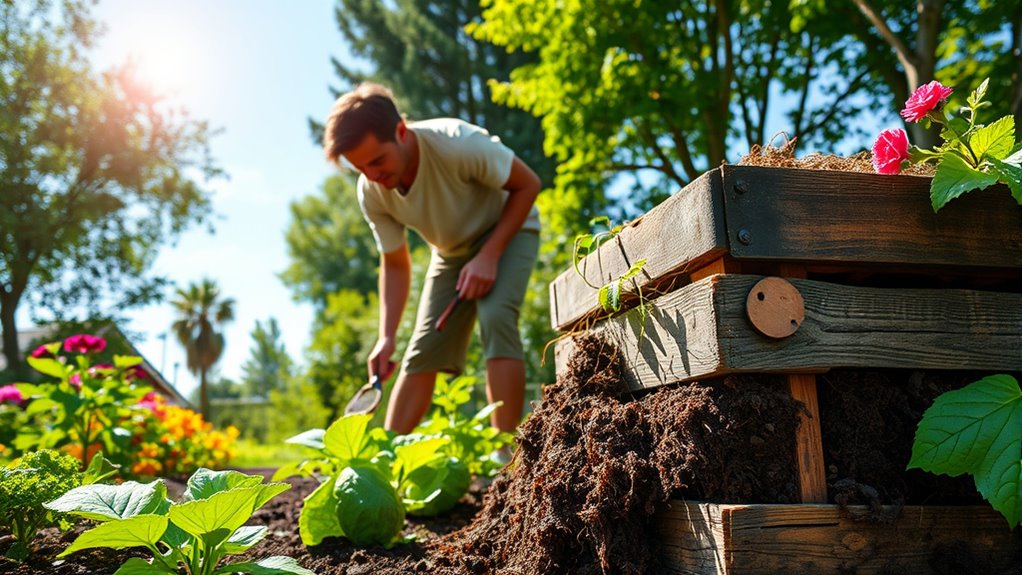Green hobbies let you enjoy fun activities while helping the planet at the same time. You can start a vegetable garden, using native plants and rainwater to save resources. Crafting with recycled materials reduces waste and sparks creativity. These eco-friendly pastimes promote biodiversity, conserve water, and support local ecosystems. By taking part in these hobbies, you’ll not only enjoy yourself but also make a positive difference. Keep exploring to discover how easy and rewarding green hobbies can be.
Key Takeaways
- Eco-friendly gardening promotes sustainability through native plants, composting, and rainwater harvesting, supporting local ecosystems.
- Sustainable crafting involves repurposing materials, reducing waste, and creating eco-conscious art and decor.
- Growing your own vegetables and herbs encourages healthy eating and reduces food miles and packaging waste.
- Participating in community plant exchanges and eco-activities fosters environmental awareness and collective action.
- Using biodegradable and recycled materials in hobbies minimizes ecological footprints and promotes mindful resource use.

Have you ever considered how your hobbies can help protect the environment? It’s easier than you might think to turn fun activities into eco-friendly practices that benefit the planet. For example, eco friendly gardening not only gives you a relaxing outdoor activity but also promotes sustainability. Instead of relying on chemical fertilizers or pesticides, you can choose organic composts, native plants, and rainwater harvesting. These choices reduce your ecological footprint and support local ecosystems. Plus, gardening helps you connect with nature, making you more conscious of environmental issues. When you plan your garden with sustainability in mind, you’re actively helping conserve water, reduce waste, and promote biodiversity. You might even grow your own vegetables and herbs, cutting down on the emissions associated with store-bought produce and packaging waste. Incorporating antioxidants from fresh produce into your diet can further support your health while promoting eco-friendly food choices.
Sustainable crafting is another engaging hobby that aligns with protecting the environment. Instead of buying new supplies, you can repurpose old materials, turning discarded items into beautiful, useful creations. Think of transforming old T-shirts into tote bags or using leftover wood for small furniture projects. This approach minimizes waste and reduces the demand for new resources. Sustainable crafting encourages creativity while emphasizing resourcefulness, making it a fulfilling way to spend your free time. It’s also an excellent way to promote awareness about waste reduction and recycling, inspiring others around you to adopt similar habits. Plus, by choosing eco-friendly materials like organic fabrics, recycled paper, or biodegradable glues, you’re ensuring your crafts are genuinely sustainable. Engaging in these hobbies not only contributes to environmental conservation but also enhances your well-being through mindful activities.
Both eco friendly gardening and sustainable crafting are activities that empower you to make meaningful environmental contributions without sacrificing enjoyment. They integrate seamlessly into daily life, transforming simple hobbies into impactful habits. By dedicating time to these pursuits, you’re not just having fun—you’re actively supporting conservation efforts, reducing waste, and promoting a greener lifestyle. These hobbies also foster a sense of community, as you can share tips, swap supplies, or organize local gardening exchanges and craft workshops. Over time, your efforts can inspire friends and family to adopt similar eco-conscious habits, amplifying your positive impact. Embracing green hobbies like these shows that protecting the planet doesn’t have to be complicated or costly; it can be integrated into activities you already love. So, next time you pick up your tools or craft supplies, think about how your choices can contribute to a healthier, more sustainable world.
Frequently Asked Questions
How Can I Start a Green Hobby With No Prior Experience?
Getting started with a green hobby is easier than you think. You can find eco-friendly tools and beginner tutorials online that guide you step-by-step. Choose an activity like gardening, composting, or upcycling, and start small. Use environmentally friendly supplies and follow tutorials designed for beginners. With a little effort and curiosity, you’ll enjoy your hobby while helping the planet. Just jump in and enjoy the process!
Are Green Hobbies Suitable for Children and Families?
You might wonder if green hobbies are suitable for children and families. The good news is, many are child-friendly activities and family outdoor projects that everyone can enjoy. You can plant a garden, go on nature walks, or start composting together. These activities promote teamwork and environmental awareness while being safe and fun for all ages, making it easy to incorporate eco-friendly habits into your family life.
What Are Some Budget-Friendly Eco-Friendly Hobby Ideas?
If you’re looking for budget-friendly eco-friendly hobby ideas, you can try recycling crafts by repurposing old materials into art or household items. Urban gardening is another great option; it’s affordable and lets you grow your own herbs or veggies in small spaces. Both activities help the environment, save money, and are easy to start with minimal investment. Plus, they’re enjoyable ways to make a positive impact on the planet.
How Do Green Hobbies Impact Local Communities?
Imagine your hobbies as seeds that blossom into vibrant community gardens. When you embrace green hobbies, you foster community engagement and bolster local sustainability. Your efforts inspire others to join, creating a ripple effect of positive change. By supporting local initiatives and practicing eco-friendly habits, you help build resilient neighborhoods, turning collective efforts into a lush landscape of environmental and social well-being for everyone to enjoy.
Can Green Hobbies Be Incorporated Into Daily Routines Easily?
You can easily incorporate green hobbies into your daily routine by recycling at home and choosing sustainable commuting options. For example, you might start by setting up a recycling system and biking or walking instead of driving. These small, consistent actions make it simple to live more eco-friendly. Over time, they become natural habits that benefit both you and the environment, making your daily routine greener and more sustainable.
Conclusion
Embracing green hobbies gently guides you toward a more harmonious relationship with our planet. Each small step, like gardening or bike riding, quietly cultivates positive change without demanding too much. As you weave these activities into your life, you’ll find yourself growing more connected and mindful, all while enjoying the simple pleasures that Mother Earth offers. Remember, even the tiniest ripples can create a beautiful, lasting impact—so why not start today and let your journey flourish?









